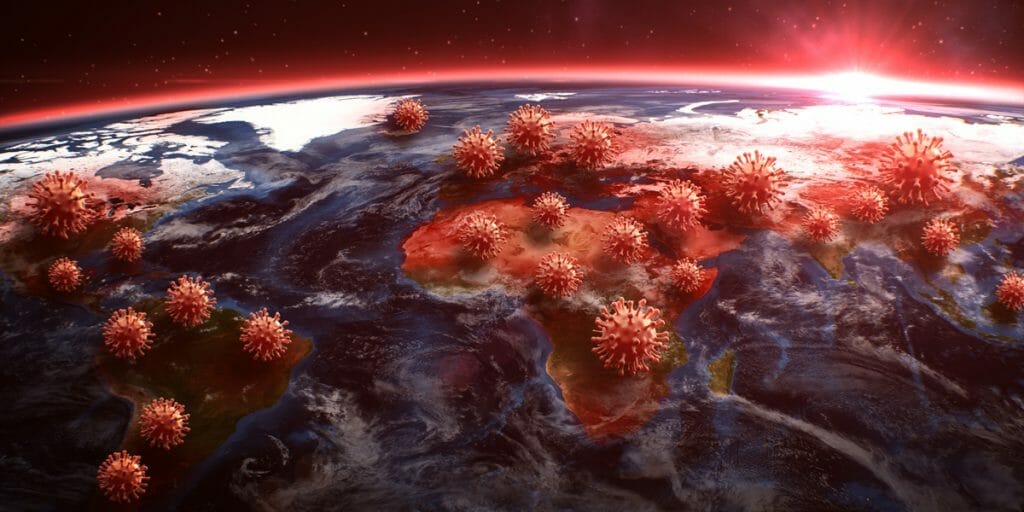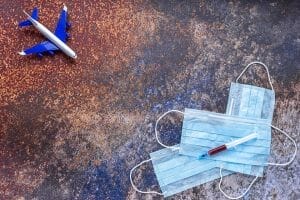
Sars-Cov-2 hit at an inauspicious geo-political and geo-environmental moment.
An era of rising nationalism and populism made it frustratingly difficult to mount a collaborative response to a global pandemic. Jair Bolsonaro of Brazil, Xi Jinping of China, Narendra Modi of India, Vladimir Putin of Russia, Recep Tayyip Erdogan of Turkey, Boris Johnson of the United Kingdom, and Donald Trump of the United States stand out. All these leaders (and their executive teams) evinced some combination of parochialism and political insecurity or ideology, which caused them to initially downplay the crisis, ignore the science, or deny its viability, and reject essential international cooperation whilst favouring corporate interests. This ensured their slow and ineffective roll out of immediate viral strategic control. Leading to significant adverse consequences driven by internal political narratives (self or party-protectionism) rather than globally focussed health care.
Early Mistakes
You may recall that in the early days of 2020, many leaders denied, and the WHO also prevaricated on the notion that what began as a regional outbreak in Wuhan, China, could spread far and wide – fast[1],[2].
As the months went on, governments imagined or hoped that the virus could be contained with border controls (where they had been applied) and that its spread would miraculously slow (or in some cases disappear) with warm weather (which appears to be misjudged)[3].
They believed that temperature checks could identify everyone who harboured the virus, that existing drugs could be repurposed to mitigate the disease, and that natural infection would result in durable immunity. All assumptions that have yet to demonstrate population wide success, and the related herd immunity proposals have yet to be proved a defining or even a qualified success[4].
As the body count rose, many leaders remained in a state of denial (and of course many, politically or ideologically aligned, argued that the numbers were inconsistent with a reality they wished to reflect). Ignoring the scientific community or at least the majority of scientists embedded in virology, immunology and pandemic management, they failed initially to encourage correct mask wearing and social distancing, even as the evidence, that these strategies reduced risk of airborne transmission mounted. Politicians and many individuals even made mask wearing a matter of political or cultural identity, despite their effectiveness[5],[6],[7].
The result of all the chaos, delay, and stupidity was a largely uncontrolled spread and a heightened death toll in countries that favoured individualism over social cohesion.
An inconvenient truth
Now, governments must come to grips with another inconvenient truth: that what many hoped would be a short-lived crisis will instead be a long, slow fight against a remarkably resilient virus. Even if every human on the planet were vaccinated tomorrow, SARS-CoV-2 would still live on in multiple animal species, including monkeys, cats, and deer, with environmental changes creating future zoonotic transfer a permanent risk, in effect it is endemic[8].
We, as the subjects in this viral migration are now faced with some clear decisions; rely on exposure, rely on vaccine, or a combination to generate neutralising antibodies and appropriate T cell responses to develop a capacity to resist adverse effects. Enhance natural immune competence with lifestyle changes, including weight reduction, nutrient stability, and social health generation, ensuring community support and regular testing. All these personal and social actions will not just enhance current needs and resilience but also ensure preparedness for future zoonotic events[9].
Failure to eradicate the virus does not mean that death, illness, or social isolation will continue at the scale seen so far. The future will depend heavily on the type and duration of immunity people acquire through infection or vaccination and how the virus evolves[10]. Influenza and the four human coronaviruses that cause common colds are also endemic[11]. But a combination of annual vaccines and acquired immunity means that societies tolerate the seasonal deaths and illnesses they bring without requiring lockdowns, masks, and social distancing.
Future risk and co-operation
 Variants are an unavoidable by-product of the pandemic’s exponential growth. In the region of half a million new cases of COVID-19 are reported every day. Each infected person harbours hundreds of billions of virus particles, all of which are constantly reproducing[12]. Each round of replication of every viral particle yields an average of 30 mutations[13]. Most mutations do not make the virus more transmissible or deadly. But with an astronomical number of mutations happening every day across the globe, there is an ever-growing risk that some of them will result in more dangerous viruses, becoming what epidemiologists call “variants of concern[14].”
Variants are an unavoidable by-product of the pandemic’s exponential growth. In the region of half a million new cases of COVID-19 are reported every day. Each infected person harbours hundreds of billions of virus particles, all of which are constantly reproducing[12]. Each round of replication of every viral particle yields an average of 30 mutations[13]. Most mutations do not make the virus more transmissible or deadly. But with an astronomical number of mutations happening every day across the globe, there is an ever-growing risk that some of them will result in more dangerous viruses, becoming what epidemiologists call “variants of concern[14].”
Sustaining our way of life thus requires deep changes in the way we interact with the natural world, the way we think about prevention, and the way we respond to global health emergencies[15]. It also requires even populist leaders to think globally, and corruption ridden governments to recognise their vulnerability and change tack (we can hope).
Conclusion
The psychiatrist Elisabeth Kübler-Ross famously and controversially outlined the 5 stages of grief that people go through as they learn to live with what has been lost: denial, anger, bargaining, depression, and acceptance. Almost everyone has experienced at least one of these stages during the pandemic, although in many ways, the world is still stuck in the first stage, denial, refusing to accept that the pandemic is far from over [16].
To these five stages, the bioethicist David Kessler has added one more that is crucial: finding meaning. From the devastation of COVID-19, the world, (and that means all of us), must work together to build an enduring system for mitigating this pandemic managing its endemic progression and preventing the next one. Figuring out how to do that might be the most meaningful challenge of our lifetime. Ignoring the short-and long-term impact of lifestyle and environmental challenges on the risk factors, and instead concentrating on ‘magical’ pharmaceutical tools alone, will leave us all weaker and more vulnerable[17].
Emotional and psychological resilience is as important as immunological capability, they are intimately linked to each other. There is of course considerable immune system diversity among humans, during health and disease. This variability can result in starkly different responses to similar challenges to homeostasis, leaving one individual more susceptible to disease and another well equipped to cope with the same pathogenic stimulus. The same variations are reflected in immune response generation via vaccines and lifestyle application and are largely influenced by their social, personal, genetic, gender and age, lifestyle and nutrition status.
Discovery of and, exposure to a natural environment as a vital component of human functionality and sustainability, has been known by many for centuries. More recently the enhanced sense of wilding our spaces as a therapeutic balm for nature and us has gained traction as part of a lifestyle approach to health generation. It does this by enhancing sympathetic nervous system (SNS) activation and the hypothalamus-pituitary-adrenal (HPA) axis[18]. The rewilding of our gastrointestinal tracts via the removal of processed foods and the ingestion of a rainbow of plants as a mechanistic approach to immune resilience reflects the duality of the vast ecological diversity required to either sustain a jungle’s or environments eco-system or ensure the myriad of competencies offered by the human colonic microbiome. Eating for biomic diversity confers advantages to immune competence as does physical immersion in diverse natural environments[19]. This approach to life, sustainability and security is where the magic happens, and in the pursuit of solutions we must retain equivalent fascination for the natural as well as the scientific solutions.
References
[1] https://www.vox.com/2020/3/30/21195469/coronavirus-usa-china-brazil-mexico-spain-italy-iran accessed 21.6.21
[2] The Independent Panel for Pandemic Preparedness and Response https://theindependentpanel.org/mainreport/ accessed 21.6.21
[3] Ma, Y., Pei, S., Shaman, J. et al. Role of meteorological factors in the transmission of SARS-CoV-2 in the United States. Nat Commun 12, 3602 (2021).
[4] Five reasons why COVID herd immunity is probably impossible https://www.nature.com/articles/d41586-021-00728-2 accessed 21.6.21
[5] Brooks JT, Butler JC. Effectiveness of Mask Wearing to Control Community Spread of SARS-CoV-2. JAMA. 2021;325(10):998–999.
[6] Zhou, L., Ayeh, S.K., Chidambaram, V. et al. Modes of transmission of SARS-CoV-2 and evidence for preventive behavioral interventions. BMC Infect Dis 21, 496 (2021). https://doi.org/10.1186/s12879-021-06222-4
[7] Cheng Y, Ma N, Witt C, Rapp S, Wild PS, Andreae MO, Pöschl U, Su H. Face masks effectively limit the probability of SARS-CoV-2 transmission. Science. 2021 May 20:eabg6296. doi: 10.1126/science.abg6296.
[8] https://www.nature.com/articles/d41586-021-00396-2 accessed 21.6.21
[9] Personalized Nutrition & the COVID-19 Era https://theana.org/COVID-19?fbclid=IwAR3AnRK5Sgkk9qcjdNqoMKG3mjLr2iqdBY2yCsPw6oHtoqZyewU5dy_y65o accessed 21.6.21
[10] A Long-term perspective on immunity to COVID Nature News and Views 14 June 2021
[11] What is coronavirus? The different types of coronaviruses https://coronavirusexplained.ukri.org/en/article/cad0003/
[13] Harvey, W.T., Carabelli, A.M., Jackson, B. et al. SARS-CoV-2 variants, spike mutations and immune escape. Nat Rev Microbiol 19, 409–424 (2021). https://doi.org/10.1038/s41579-021-00573-0
[14] https://www.acrobiosystems.com/A1226-SARS-CoV-2_spike_mutants.html?gclid=CjwKCAjw8cCGBhB6EiwAgORey_Jw913-u8Byx-9urCzlFP-MhMoM59uuAutVYkCRiaj834JFCtt79xoCPuAQAvD_BwE accessed 21.6.21
[15] Rewilding Video – Stephen Harding https://www.youtube.com/watch?v=IxU4Q4TqHJk
[16] The Five Stages of Grief An Examination of the Kubler-Ross Model https://www.psycom.net/depression.central.grief.html
[17] https://www.legacy.com/advice/the-sixth-stage-of-grief-finding-meaning-by-david-kessler/ accessed 21.6.21
[18] Bajpai G, Nahrendorf M. Infectious and lifestyle modifiers of immunity and host resilience. Immunity. 2021 Jun 8;54(6):1110-1122.
[19] Andersen L, Corazon SSS, Stigsdotter UKK. Nature Exposure and Its Effects on Immune System Functioning: A Systematic Review. Int J Environ Res Public Health. 2021 Feb 3;18(4):1416.
